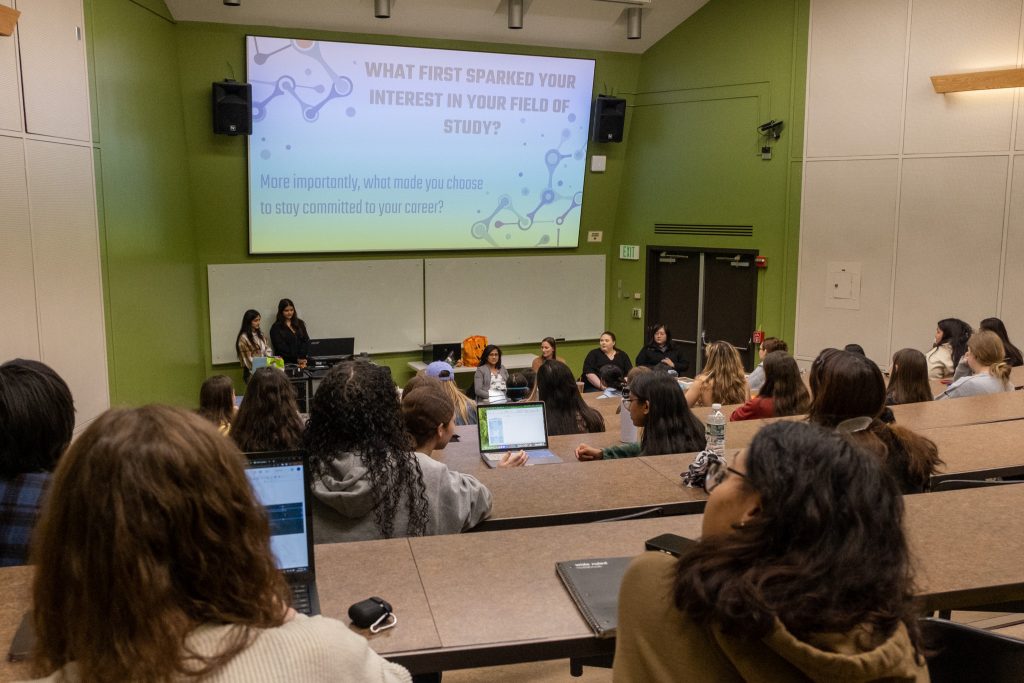This Monday, a panel was hosted for women in science, technology, engineering and math (STEM).
The event was a collaboration between Scientista — an organization aimed at providing content, resources and networking opportunities to preprofessional women in STEM — members of the Society of Women Engineers (SWE), Women in Tech (WIT) and the Association for Women in Mathematics (AWM). The panel consisted of four Binghamton University faculty members in engineering, math and neuroscience, who discussed their careers and gave advice for women aspiring to work in STEM fields.
Bing Si, an assistant professor in systems science and industrial engineering, explained her reasoning behind switching fields in between her undergraduate and graduate years.
“[In math,] we assume that everything is in a perfect environment,” Si said. “I just really wanted to do some real-world applications, to see how my skills could be used to cope with real-world problems, so that’s why after my undergraduate I decided to move fields and get a Ph.D. in industrial engineering.”
Megan Johnson, a visiting professor in mathematics and statistics who will be moving to SUNY Fredonia in the fall, discussed how influential strong family support was when she was completing her degree.
“My aunt is a mathematician at SUNY Fredonia, so I’m actually going to be her coworker, and she’s always been a huge inspiration to me,” Johnson said. “One thing that always brings a little tear to my eye is that she dedicated her Ph.D. to my great-great-grandmother, who was actually surprisingly studying mathematics and wanted to get her Ph.D. in the early 1900s. She had to choose between settling down to care for her family and getting a Ph.D. in mathematics, which was kind of unheard of at the time.”
In addition to discussing personal motivations and inspirations, panel members discussed and critiqued current barriers for women working in STEM fields — noting the decrease in the number of women as the education level increases. Panel members also highlighted the importance of outreach to younger students and suggested advocacy tips for current students.
Johnson explained the importance of reaching out to young girls at an early age in order to support them in developing a strong STEM foundation.
“[The study] showed that boys and girls mapped capabilities relatively the same until a particular time period in elementary school, where suddenly it dropped,” Johnson said. “And so I think we, in the future, we need to target those young girls and get them more interested in STEM.”
Ayesha Patel, a member of Scientista and junior majoring in biology, explained some of the initial goals of the organization.
“We created this organization our freshman year of high school to help women in STEM, but for each discipline in STEM,” Patel said. “We knew that each school at [BU] had a club that was catered toward women in STEM, but only for that specific department or major.”
The organizations often hold other career-focused events. SWE offers a variety of professional panels and social events for women aiming to go into engineering fields, as stated on their website. WIT is open to students of all majors who want to learn more about opportunities in the technology field available both during and after graduation. AWM is a national organization that aims to provide similar opportunities for women and other underrepresented groups in mathematical fields.
Past events with Scientista have included internship informational events and study sessions. Their intent, as stated on Scientista’s Instagram, is to empower “a community of women in STEM through networking opportunities and professional resources.”
Yuktha Chiguripati, a junior double-majoring in biology and English, said that she wanted this event to give people the opportunity to build their network and find mentors.
“I just want people to feel like they have a community here,” Chiguripati said. “At my high school, we didn’t really have any women in those kinds of clubs, or anything, so it was kind of like every man for himself. I came here and realized that college was just so different and everyone wanted to support each other. Our goal is that everybody has someone to go to, and everybody can make a friend or find a mentor.”



